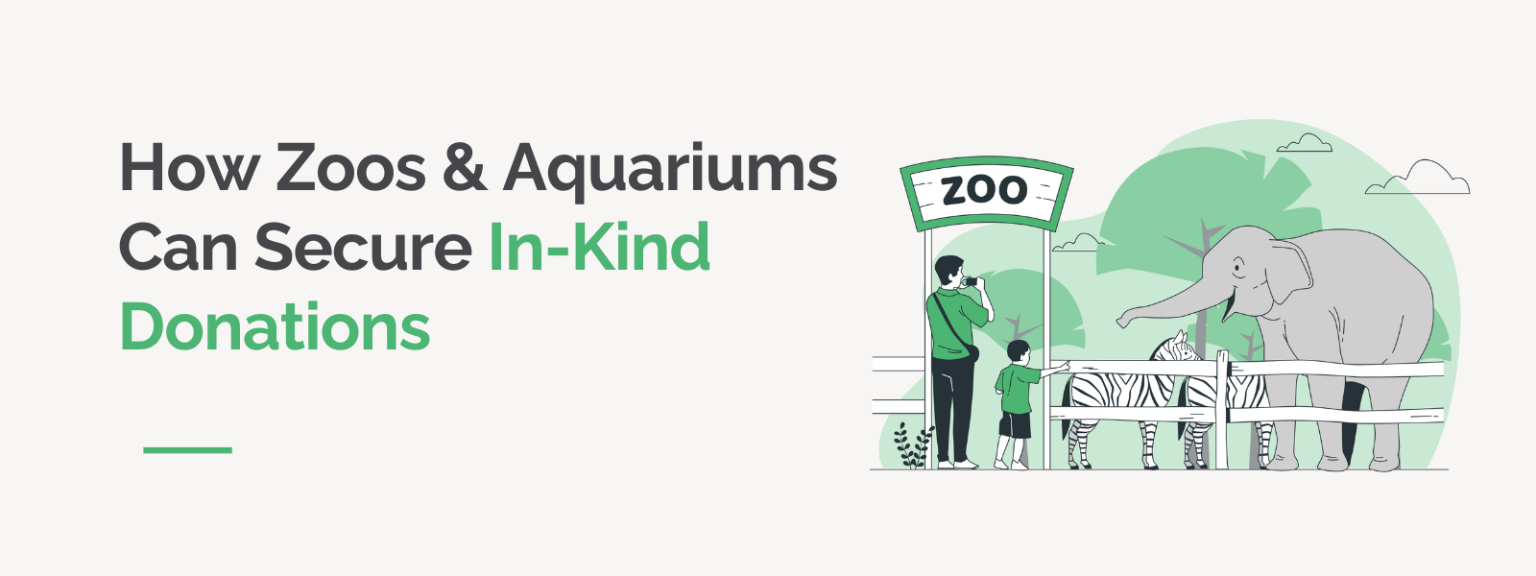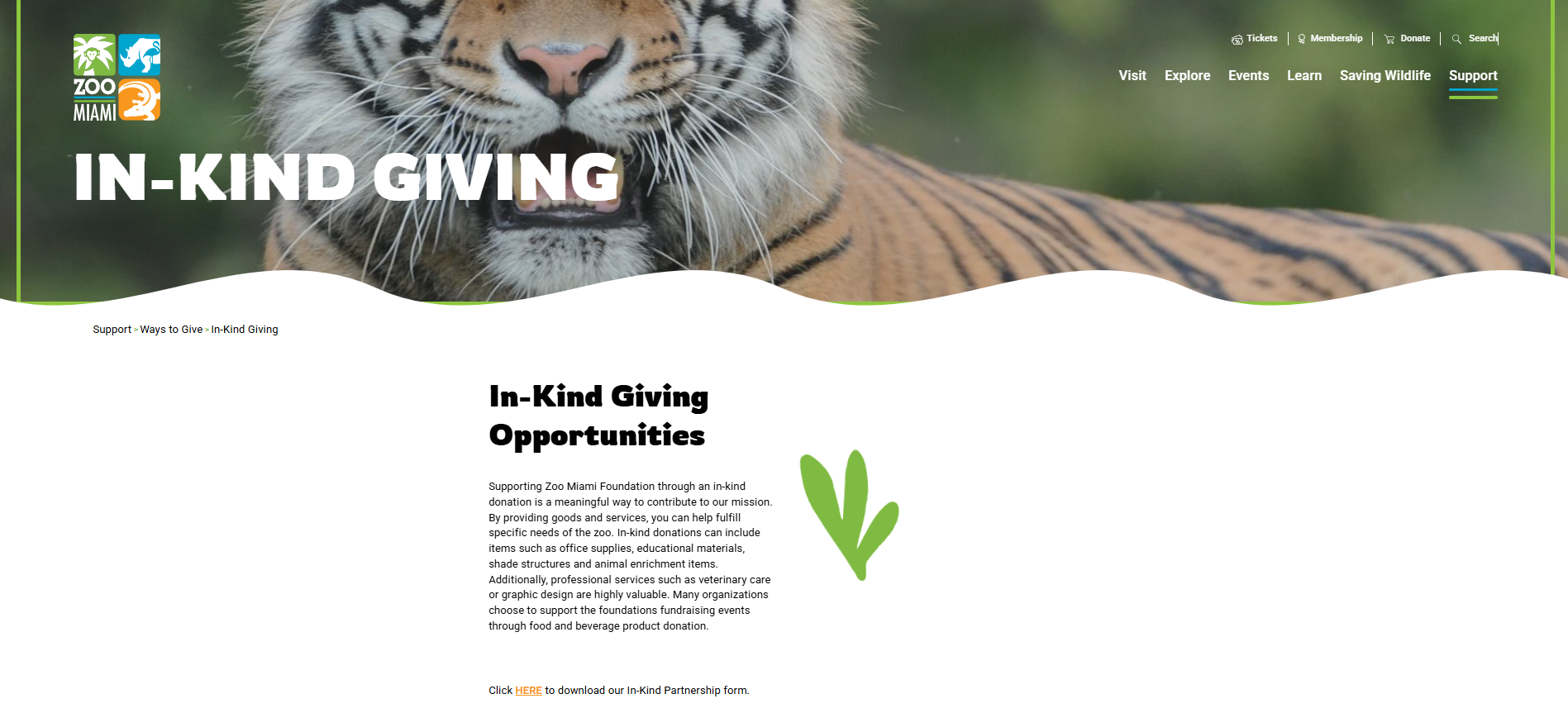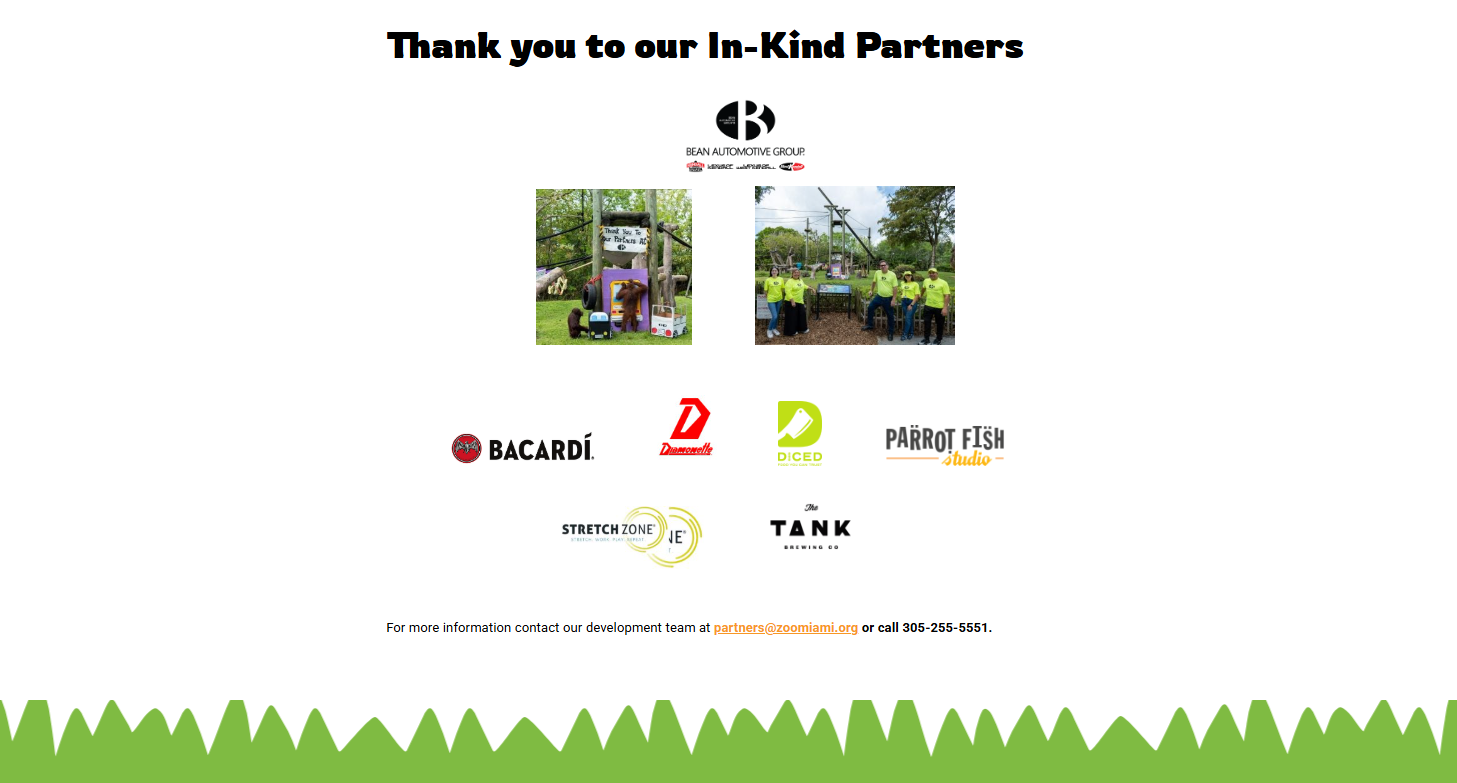How Zoos & Aquariums Can Secure In-Kind Donations
Zoos and aquariums play a vital role in wildlife conservation, education, and research. To fulfill their mission, these organizations often rely on a variety of resources beyond traditional cash donations. One powerful way to support their operations is through in-kind donations—non-cash gifts that provide essential goods and services. Understanding how to secure these donations can significantly enhance a zoo or aquarium’s capacity to care for animals, improve habitats, and engage the community.
In-kind donations offer a unique opportunity for zoos and aquariums to receive specialized items such as animal food, veterinary supplies, habitat materials, and technology. These contributions help reduce operational costs and allow organizations to allocate more funds toward program development and conservation efforts. By tapping into corporate partnerships and community goodwill, zoos and aquariums can build sustainable support networks that extend far beyond monetary gifts.
For nonprofit professionals working in zoos and aquariums, mastering the art of securing in-kind donations is a strategic advantage. It requires a clear understanding of what types of donations are most impactful, where to find potential donors, and how to approach companies with compelling requests. This article will guide you through these essential steps, providing practical advice to maximize your fundraising success and deepen your organization’s impact.
Table of Contents
- What Are In-Kind Donations for Zoos & Aquariums?
- Types of In-Kind Donations for Zoos & Aquariums
- Where Zoos & Aquariums Should Look for In-Kind Support
- How Zoos & Aquariums Should Make the In-Kind Donation Ask
- Tools and Resources to Help Zoos & Aquariums Get Started
- Success Story: How Zoo Miami Secures In-Kind Donations
What Are In-Kind Donations for Zoos & Aquariums?
In-kind donations refer to non-monetary gifts provided to nonprofits, including goods, services, or expertise. Unlike traditional cash donations, which offer financial flexibility, in-kind gifts directly supply the resources an organization needs to operate. These can range from physical items like equipment and supplies to professional services such as marketing support or legal advice.
For zoos and aquariums, in-kind donations are especially valuable because they often require specialized materials and services that can be costly or difficult to source. For example, animal nutrition is a critical area where donated food products from companies offering these products can make a significant difference. Similarly, habitat materials such as lumber or landscaping supplies create enriching environments for animals.
Veterinary supplies and pharmaceuticals are another crucial category, providing essential medicines and health products that support animal care. Technology donations can enhance operational efficiency, from data management to visitor engagement. By leveraging in-kind donations, zoos and aquariums can stretch their budgets further, improve animal welfare, and deliver more impactful educational programs.
How In-Kind Donations Differ from Cash Gifts
While cash gifts provide flexibility to address a range of needs, in-kind donations offer targeted support that directly addresses specific operational challenges. They reduce the need for purchasing essential items, freeing up funds for other priorities. However, managing in-kind donations requires clear communication and coordination to ensure the gifts align with the organization’s needs and standards.
Why In-Kind Donations Matter for Zoos & Aquariums
Zoos and aquariums operate in a resource-intensive environment where the quality of care and visitor experience depends on access to specialized goods and services. In-kind donations help bridge funding gaps and provide tangible assets that enhance animal habitats, health, and enrichment. They also foster community and corporate engagement by allowing partners to contribute in ways that showcase their expertise and products.
Types of In-Kind Donations for Zoos & Aquariums
Zoos and aquariums benefit from a diverse range of in-kind donations that support their mission and daily operations. Below are some specific examples that illustrate the breadth and impact of these gifts.
Food & Nutrition Supplies
Donations of specialized animal food from companies are invaluable. These products meet the dietary needs of various species, ensuring optimal health and well-being. Receiving high-quality nutrition donations reduces costs and guarantees consistent feeding standards.
Habitat Materials
Materials such as lumber, soil, plants, and landscaping supplies donated by retailers help create and maintain naturalistic habitats. These donations enhance animal enrichment and visitor experience by providing safe, stimulating environments.
Veterinary Supplies and Pharmaceuticals
Some companies provide essential medicines, vaccines, and medical equipment for animal healthcare. These donations support veterinary teams in delivering preventive care and treatment, which is critical for conservation and rehabilitation efforts.
Technology and Equipment
Donations of computers, software, and printing services from companies help zoos and aquariums manage operations, marketing, and educational outreach. Technology gifts improve efficiency and enable innovative visitor engagement strategies.
Professional Services
Skilled volunteer work or pro bono services in areas like graphic design, legal advice, or event planning can significantly boost capacity. For example, marketing and printing providers can provide design and printing services for fundraising campaigns and educational materials, enhancing the nonprofit’s visibility and professionalism.
Transportation and Logistics Support
Donations of transportation services or vehicles can assist with animal transfers, supply deliveries, or outreach programs. These contributions reduce logistical challenges and costs, enabling smoother operations.
Where Zoos & Aquariums Should Look for In-Kind Support
Identifying the right sources for in-kind donations requires strategic research and relationship-building. Zoos and aquariums should start by exploring companies with corporate social responsibility (CSR) programs that align with conservation, animal welfare, or community engagement. Local businesses invested in community impact are also promising partners.
Building connections with these companies can lead to ongoing support and mutually beneficial collaborations.
Purina
Purina frequently donates animal nutrition products tailored to the dietary needs of various species. Their support aligns with zoos and aquariums’ focus on animal health and well-being, making them a natural partner for food donations.
Mazuri
Mazuri specializes in exotic animal diets and sometimes provides in-kind food donations. Their expertise ensures that zoos and aquariums receive high-quality nutrition that supports conservation and care efforts.
Hill’s Pet
Hill’s Pet offers veterinary nutrition products that help maintain animal health. Their donations support veterinary teams and align with the mission of promoting animal welfare.
Home Depot
Home Depot donates habitat materials, including lumber, tools, and landscaping supplies. Their community-focused CSR initiatives make them a valuable partner for habitat enhancement projects.
Zoetis
Zoetis donates veterinary pharmaceuticals and medical supplies critical for animal health care. Their contributions have a direct impact on the quality of veterinary services that an organization can provide.
Canva
Canva offers graphic design tools and services that can be donated or discounted for nonprofit use. This support helps zoos and aquariums create compelling marketing and educational materials.
Microsoft
Microsoft offers software donations and technology support that help zoos and aquariums manage data, communications, and virtual programming.
How Zoos & Aquariums Should Make the In-Kind Donation Ask
Making a successful in-kind donation request requires a thoughtful, strategic approach. Building long-term relationships with corporate partners is key, as is aligning your nonprofit’s needs with the company’s mission and giving priorities. A well-crafted ask makes it easy for businesses to say yes and fosters ongoing collaboration.
Personalize Your Outreach
Address the company by name and reference specific initiatives or values that resonate with your mission. This shows respect and increases the likelihood of a positive response.
Be Clear and Specific
Detail exactly what items or services you need and how they will be used. Specificity helps donors understand the impact of their gift and reduces confusion.
Highlight Mutual Benefits
Emphasize how the partnership benefits the company, including brand exposure, community goodwill, and employee morale.
Offer Flexible Giving Options
Allow donors to choose from various ways to contribute, making it easier for them to participate.
Make It Easy to Give
Provide clear instructions, contact information, and any necessary forms or links to streamline the donation process.
Tools and Resources to Help Zoos & Aquariums Get Started
Securing in-kind donations can be complex, but dedicated tools can simplify the process. Many companies have established donation programs, but finding and tracking these opportunities manually is time-consuming. Using specialized resources helps nonprofit professionals uncover relevant corporate giving programs efficiently.
Tools designed for nonprofits can help zoos and aquariums identify companies whose CSR initiatives align with their mission. They provide direct links to application portals, eligibility criteria, and program details, saving valuable research time. Additionally, these platforms enable organizations to track outreach efforts and manage relationships with potential donors.
For example, Double the Donation offers a comprehensive corporate giving program database that includes thousands of verified programs, covering in-kind donations, grants, and workplace giving. This resource empowers zoos and aquariums to expand their network of potential partners and streamline their fundraising strategies.
Success Story: How Zoo Miami Secures In-Kind Donations
Zoo Miami provides a premier example of how zoological organizations can strategically solicit non-monetary gifts to sustain complex animal care and conservation initiatives. By maintaining a professional “In-Kind Giving” landing page, the zoo transforms the procurement of essential goods and services into a community-driven revenue stream. This approach is vital for large-scale wildlife facilities that must manage high overhead costs while providing world-class veterinary care and enrichment.
View the web page here: https://www.zoomiami.org/in-kind-giving
Diversifying Support Through Professional and Physical Assets
The Zoo Miami strategy focuses on removing the mystery of what a zoo needs by explicitly listing high-value donation categories. This allows both small businesses and major corporations to identify exactly how their surplus inventory or professional skills can make a tangible difference.
The organization prioritizes several mission-critical areas for in-kind support:
- Specialized Professional Services: The zoo highlights the immense value of pro-bono veterinary care, graphic design, and other technical skills that reduce administrative and operational costs.
- Animal Enrichment and Care: Shade structures and enrichment items directly enhance the well-being of the zoo’s inhabitants.
- Operational Resources: Donors can provide office supplies and educational materials to support the zoo’s extensive public outreach programs.
- Event and Hospitality Partnerships: Many organizations support the foundation’s fundraising events by donating food and beverage products.
Rewarding Corporate Partners through Public Recognition
To foster long-term relationships, Zoo Miami offers a robust recognition platform for its in-kind partners. By showcasing the logos of contributing businesses, ranging from automotive groups to local breweries, the zoo provides tangible marketing value in exchange for their generosity. This public gratitude serves as a powerful incentive for other local businesses to join the zoo’s conservation ecosystem.
By providing a downloadable “In-Kind Partnership form” and direct contact information for its development team, Zoo Miami acts as a concierge for its supporters. This streamlined process ensures that every gift (from a pallet of bottled water for volunteers to a specialized surgical consultation) is processed efficiently and utilized where it is needed most.
Wrapping Up & Next Steps
Securing in-kind donations is a strategic way for zoos and aquariums to enhance their resources and advance their mission. By identifying specific needs, researching aligned corporate partners, and making thoughtful, personalized asks, nonprofit professionals can unlock valuable support that goes beyond cash gifts.
Utilizing tools like Double the Donation’s corporate giving database streamlines the process, saving time and expanding your network of potential donors. With a clear plan and the right resources, zoos and aquariums can build sustainable partnerships that improve animal care, enrich habitats, and engage communities more effectively.
Taking the first steps today—such as creating a wish list, researching companies, and leveraging technology—will position your organization for long-term success in securing impactful in-kind donations.
Maximize Your In-Kind Donation Potential with Double the Donation
Corporate sponsorships and in-kind donations are critical to the success of nonprofit events and programs—but sourcing the right partners can be time-consuming and overwhelming. Double the Donation streamlines the entire process, helping your team find, secure, and manage corporate support with ease. With our industry-leading corporate giving database, you can quickly identify companies that offer financial sponsorships, in-kind donations, and corporate grants—giving you a data-driven edge in building meaningful partnerships.
Discover how you can raise more with corporate grants and in-kind gifts. Request a demo today to get started!






